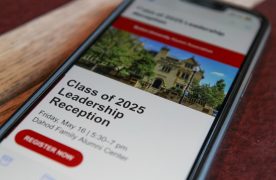We’ve all been accused of having “easy” days. The common idea is that we wake up at 11 a.m., stroll out of our luxurious apartments, go to class for four hours, come home and crawl right back into bed with our headphones and Netflix subscriptions. But let’s call this what it is: a misconception. For many of us, our college days don’t work this way.
But Arizona State University professor Jeffrey Selingo seems to think that this is a fantastic representation of what our lives are like here at the typical American university. In response to a new book on the failures of helicopter parenting, which argues that parents are unsuccessful in preparing their children to go off to college and the “real world,” Selingo claims that colleges are just as responsible for this kind of “coddling.”
Selingo uses his soapbox at The Washington Post to make grandiose statements about today’s college student, specifically at public universities like ASU. He says that because students are introduced to their roommates online before getting to school, they no longer have to resolve conflicts with random strangers in close living quarters. He also argues that the “luxurious apartment-like dorms” mean that students will never have to share living space or eat in dining halls.
Selingo also states that computer-generated programs that help students choose their majors and degrees are ruining the chance for failure because they map out our paths for the future. In the past, the student next to you might not have graduated, but now A’s account for 43 percent of grades nationwide.
According to Selingo, the glut of A’s must mean students aren’t being exposed to feedback — instead, we are handed semester-long projects that we turn in and never see again. We don’t complete drafts or take steps as one would do in the business world.
In all, our coddled isolation makes us “paralyzed of the prospect of failure,” because most of us have never experienced it.
While Selingo’s statements may ring true for Arizona State — we don’t go there, so we can’t know the situation — they contradict what we face as students here at BU. It’s as if Selingo noticed a single cartoon of millennial college students and decided to take it as a core representation of college students nationwide.
It’s ridiculous to assume that because we meet students online we don’t face the struggles of living with another. Living with someone always brings challenges — people always have habits in their own homes that no one sees until they are behind closed doors.
And in many cases, like ours at BU, luxurious dorms aren’t something we have access to until after we have lived in the classic dorm situation at Warren Towers or in West Campus. We eat in dining halls for almost every meal, we share communal bathrooms and we are kept up all night while our roommate has the light on.
Even in apartments here at BU, the number of students who have their own bathroom is slim. And if they do, they have the money to pay for that luxury. This coddling doesn’t stem from university, but from the fact that these students are still coddled by their parents. Most college students we know are struggling even to pay the ridiculously expensive room and board fees that plague our tuition bills each semester.
While we’re at it, let’s discuss Selingo’s claim that an organized system of academic advising is detrimental. Of course, technology might not be perfect, but most of us benefit from having access to the sort of pathfinder that he describes. No plan that we make is ever perfectly planned out, though, so even a computerized system has room for failure and struggles along the way.
And what’s the alternative? Would we rather have students learn to do something they hate or are terrible at, and in turn become sucks on the system? Not so much.
The point is, we still have to make plenty of decisions for ourselves. Even on the small scale, we visit advisors who tell us what classes we still need to take. What is so wrong with that? Just because our parents pay for college doesn’t mean we don’t face struggle — many of us work hard every day to attend school. We can’t all be clustered into a stereotype that relies on mommies and daddies for some extra cash every time we want a new pair of shoes.
Perhaps the most offensive claim Selingo makes is that students have never experienced failure, and that we are automatically being handed A’s for all of the work we complete. Of course, we understand that there is an element of entitlement among students for good grades. It’s true that people get upset over minor grade discrepancies. But a more appropriate model, at least for students at BU, is the so-called “weed out” course that pushes us to our limits to see who is strong enough to survive. It seems that both extremes are detrimental in their own ways. On one hand, some professors may overlook a half-baked project and give a student an A based on personality. Other professors tell us from the start that they “don’t give A’s” on principle. There’s a balance either way.
That being said, many of us are forced to work harder just to attempt to earn that elusive A. We attend office hours, maintain relationships with our professors and lose sleep to get our assignments completed on time and up-to-snuff. Very rarely do we experience an instance in which a professor doesn’t invite us to office hours or hands back an assignment without criticism. And if they do turn us away or discourage us, we either become disinterested and stop trying, or we fight harder to prove them wrong. Perhaps we should weed people out this way instead of commencing the semester with an announcement that students won’t be receiving A’s.
Selingo can’t rightly make the claim that all college students don’t care about their education. Of course we are looking to get a job after graduation, but we also are at college to learn and grow. In one way, we prepare ourselves for the trials of the real world. In another way, we gain knowledge in our classes and in our lives outside them.
We understand that this world is cutthroat. We understand that some people don’t realize that. Someday, they will learn. But for now, the biggest takeaway is that it’s impossible to make such huge generalizations as these, even if we were to agree with them. The college experience is different for everyone. Not all of us sit in luxury apartments with fabulous roommates and drink wine — some of us live in closets with random roommates and drink cheaper wine. But that’s our prerogative, and colleges can’t be held responsible. The only people we can hurt are ourselves.














So, is the FREEP defending BU in this article?